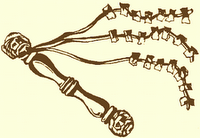Followup Questions: Temporal Punishment
Q: Can you give me an example temporal punishment? Is that what you mean by “terrors of conscience”? Even though we are forgiven, must we still endure temporal punishment while on this side of Heaven although we are spared from eternal punishment? In other words, do we suffer the consequences of our sin, and our sinful nature, during earthly life?
 A: The ultimate temporal punishment is temporal (physical) death. Death is the wage we sinners earn and death remains, for most, the single most terrifying judgment. I’m convinced that much of what people do to look and feel younger, while attributed to other causes, finally stems from human efforts to cheat death — or at least to avoid it for as long as possible.
A: The ultimate temporal punishment is temporal (physical) death. Death is the wage we sinners earn and death remains, for most, the single most terrifying judgment. I’m convinced that much of what people do to look and feel younger, while attributed to other causes, finally stems from human efforts to cheat death — or at least to avoid it for as long as possible.Remember that in our confession of sins, we say that we “have deserved ... temporal and eternal punishment.” This, however, doesn’t mean that we receive it. If we received our due judgment, how could it be anything less than full “eye for an eye” retribution? Every cent a person stole would be taken from him. Every nasty bit of gossip one spread would draw equally foul gossip in return. Each offense would result in a responding action of like magnitude: Rapists raped, abusers abused, slanderers slandered, and so on — that would be our lot.
 On top of quid pro quo penalties, should not appropriate restitution also be levied? Therefore, the thief would not only have what he stole taken away, he would also have to pay like amount back directly to his victims. One who caused great physical pain would not only feel the same hurt in his own body, he would also be required to work to remove the pains he inflicted. Yet most of the world’s most vile and violent sinners see nothing so severe laid upon themselves. Such may be what we deserve but it’s rarely what anyone receives.
On top of quid pro quo penalties, should not appropriate restitution also be levied? Therefore, the thief would not only have what he stole taken away, he would also have to pay like amount back directly to his victims. One who caused great physical pain would not only feel the same hurt in his own body, he would also be required to work to remove the pains he inflicted. Yet most of the world’s most vile and violent sinners see nothing so severe laid upon themselves. Such may be what we deserve but it’s rarely what anyone receives.Furthermore, just undergoing severe pain doesn’t mean that a person is actually being punished. Sometimes the least deserving receive the harshest treatment. After all, before allowing Satan to afflict him, the Lord said of Job, “There is none like him on the earth, a blameless and upright man, who fears God and turns away from evil. (1:8)” Compare Job’s subsequent suffering with Deuteronomy 8:5 and with Hebrews 12:6, which says, “The Lord disciplines the one he loves, and chastises every son whom he receives.”
 It’s not in Job, however, where we see the fullness of this discipline and chastisement. Instead, we must look to the suffering and death of Jesus Christ. In His all-out effort to balance the books in our favor, the Father laid full temporal punishment for our sins upon His sinless Son. In light of the prophecy of Isaiah 53:5 and its fulfillment through Jesus’ passion, consider these two questions: Who was ever disciplined more harshly than the One whome the Father loves above all others? And which of His other children ever received the chastisement the Father laid upon His only-begotten Son?
It’s not in Job, however, where we see the fullness of this discipline and chastisement. Instead, we must look to the suffering and death of Jesus Christ. In His all-out effort to balance the books in our favor, the Father laid full temporal punishment for our sins upon His sinless Son. In light of the prophecy of Isaiah 53:5 and its fulfillment through Jesus’ passion, consider these two questions: Who was ever disciplined more harshly than the One whome the Father loves above all others? And which of His other children ever received the chastisement the Father laid upon His only-begotten Son?At first glance, the negative consequences you mention could be considered punishment for our sins. However, Christ’s sacrifice was all-availing. So how could anyone, especially any believer, feel even the smallest fraction of God’s temporal punishment? If we are not guilty of any sins, we cannot be expected to pay for them. Next, since we neither see into our neighbor’s heart nor comprehend the mind of God, we cannot even determine whether or not anyone is actually receiving temporal punishment corresponding to his sin. For example, when the disciples met a blind man, “They ... asked [Jesus], ‘Rabbi, who sinned, this man or his parents, that he was born blind?’ (John 9:2)” Jesus replied that the blindness came not as punishment but rather “that the works of God might be displayed in him. (v. 3)” Then Jesus proved His point by healing the man.
 We only know with certainty that someone receives temporal punishment if God tells us so. We know from Genesis 18 that because of their unrelenting evil, Sodom and Gomorrah were obliterated. Because of Nebuchadnezzar’s pride in his empire and his accomplishments, God punished him by making him insane: “He was driven from among men and ate grass like an ox, and his body was wet with the dew of heaven till his hair grew as long as eagles’ feathers, and his nails were like birds’ claws. (Daniel 4:33)” Because “the voice of [Abel’s] blood” cried to the Lord “from the ground,” the Lord punished Cain, telling him, “You are cursed from the ground, which has opened its mouth to receive your brother’s blood from your hand. (Genesis 4:10-11)” God went on to say, “You shall be a fugitive and a wanderer on the earth. (v. 12)”
We only know with certainty that someone receives temporal punishment if God tells us so. We know from Genesis 18 that because of their unrelenting evil, Sodom and Gomorrah were obliterated. Because of Nebuchadnezzar’s pride in his empire and his accomplishments, God punished him by making him insane: “He was driven from among men and ate grass like an ox, and his body was wet with the dew of heaven till his hair grew as long as eagles’ feathers, and his nails were like birds’ claws. (Daniel 4:33)” Because “the voice of [Abel’s] blood” cried to the Lord “from the ground,” the Lord punished Cain, telling him, “You are cursed from the ground, which has opened its mouth to receive your brother’s blood from your hand. (Genesis 4:10-11)” God went on to say, “You shall be a fugitive and a wanderer on the earth. (v. 12)”Meanwhile, 1 John 3:15 sums up Jesus’ teachings about hatred being akin to murder (cf. Matthew 5:21-26): “Everyone who hates his brother is a murderer, and you know that no murderer has eternal life....” Like Cain, those who hate their biological siblings, their brothers in the Faith, or any of the family of man deserve “temporal and eternal punishment” for this sin. So does anyone else committing any other offense against God or man.
 Yet we don’t get what we deserve. Instead, God foretold how His Servant Son would receive our punishment: “He has borne our griefs and carried our sorrows.... He was wounded for our transgressions; he was crushed for our iniquities ... with his stripes we are healed.... The Lord has laid on him the iniquity of us all. (Isaiah 53:4-6)” The Lord could promise forgiveness and healing because He planned to make His Son’s soul “an offering for guilt,” allowing His “righteous one” to “make many to be accounted righteous” by bearing our iniquities (vv. 10-11).
Yet we don’t get what we deserve. Instead, God foretold how His Servant Son would receive our punishment: “He has borne our griefs and carried our sorrows.... He was wounded for our transgressions; he was crushed for our iniquities ... with his stripes we are healed.... The Lord has laid on him the iniquity of us all. (Isaiah 53:4-6)” The Lord could promise forgiveness and healing because He planned to make His Son’s soul “an offering for guilt,” allowing His “righteous one” to “make many to be accounted righteous” by bearing our iniquities (vv. 10-11).As we look around, we see that even the most vicious and violent sinners seemingly do not face the temporal punishment they deserve. Instead, God appears to withhold pouring out His full wrath on them in order to allow time for the Holy Spirit to bring them to faith, repentance, forgiveness, and salvation. Eternal punishment will be levied for only one sin, “blasphemy against the Spirit, (Matthew 12:31)” which means they refuse the Gospel, resist the Spirit, and reject the Son. Only those who will not accept the gift of forgiveness and new life that Jesus purchased and won will feel the absolute horror of “the second death, the lake of fire. (Revelation 20:14)”
For more on the sin of blasphemy against the Holy Spirit, please see Soul Selling, Satan, and Sin Against the Spirit and Sinning Against the Spirit.
Scripture quoted from The Holy Bible, English Standard Version™, © 2001 by Crossway Bibles.
Send email to Ask the Pastor.
Walter Snyder is the pastor of Holy Cross Lutheran Church, Emma, Missouri and coauthor of the book What Do Lutherans Believe.
Technorati Tags: punishment | temporal punishment | eternal punishment | wrath | justice | sin | judgment | mercy | grace | forgiveness | forgiveness of sins | Vicarious Atonement | atonement | doctrine | theology | exegetical theology | exegesis | systematic theology | Christology | Christ | Jesus Christ | Jesus | Lutheran | Lutheranism | Christian | Christianity | Pastor Walter P. Snyder | Walter Snyder | Ask the Pastor
Newspaper column #551

0 Comments:
Post a Comment
<< Home